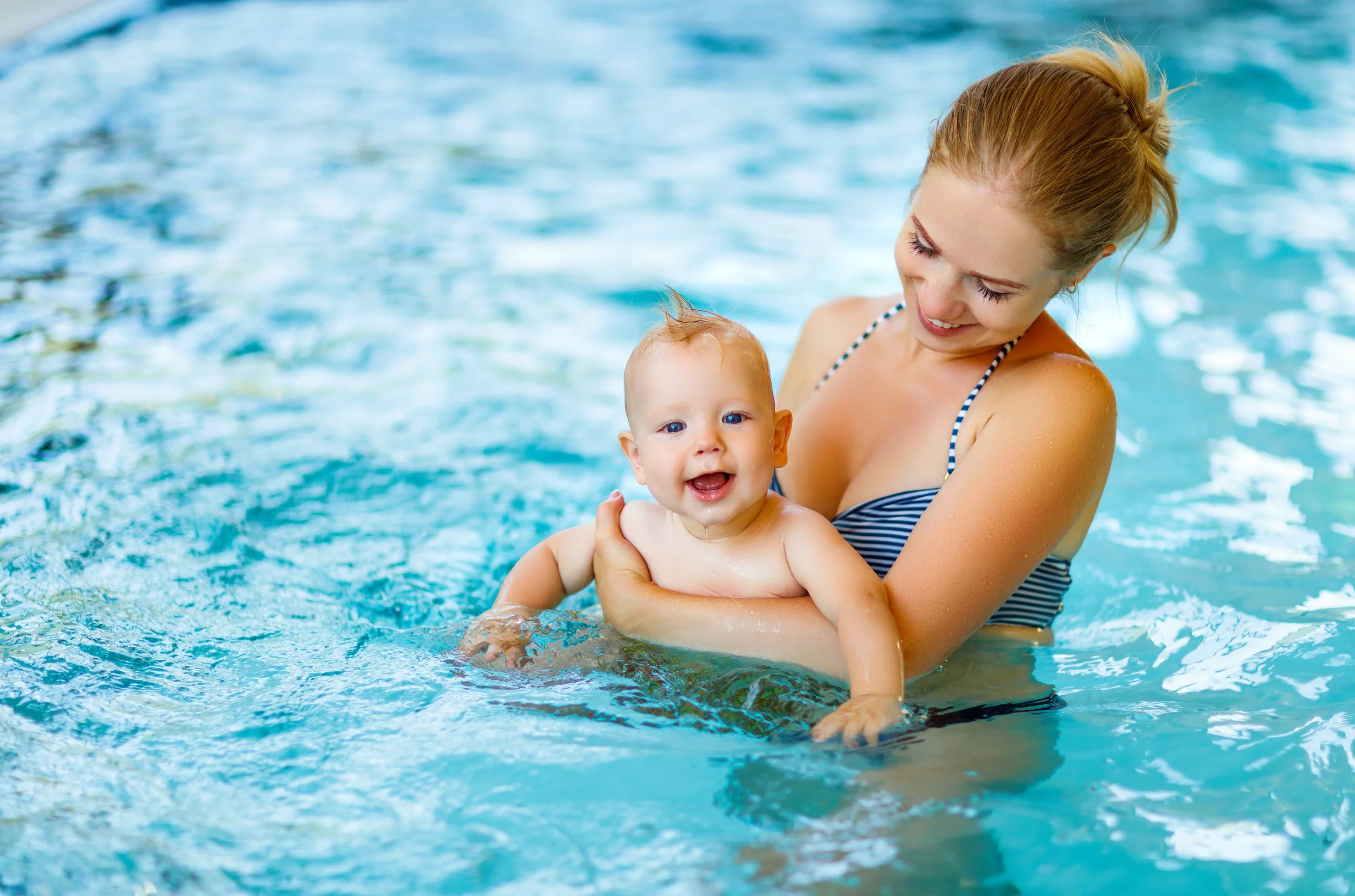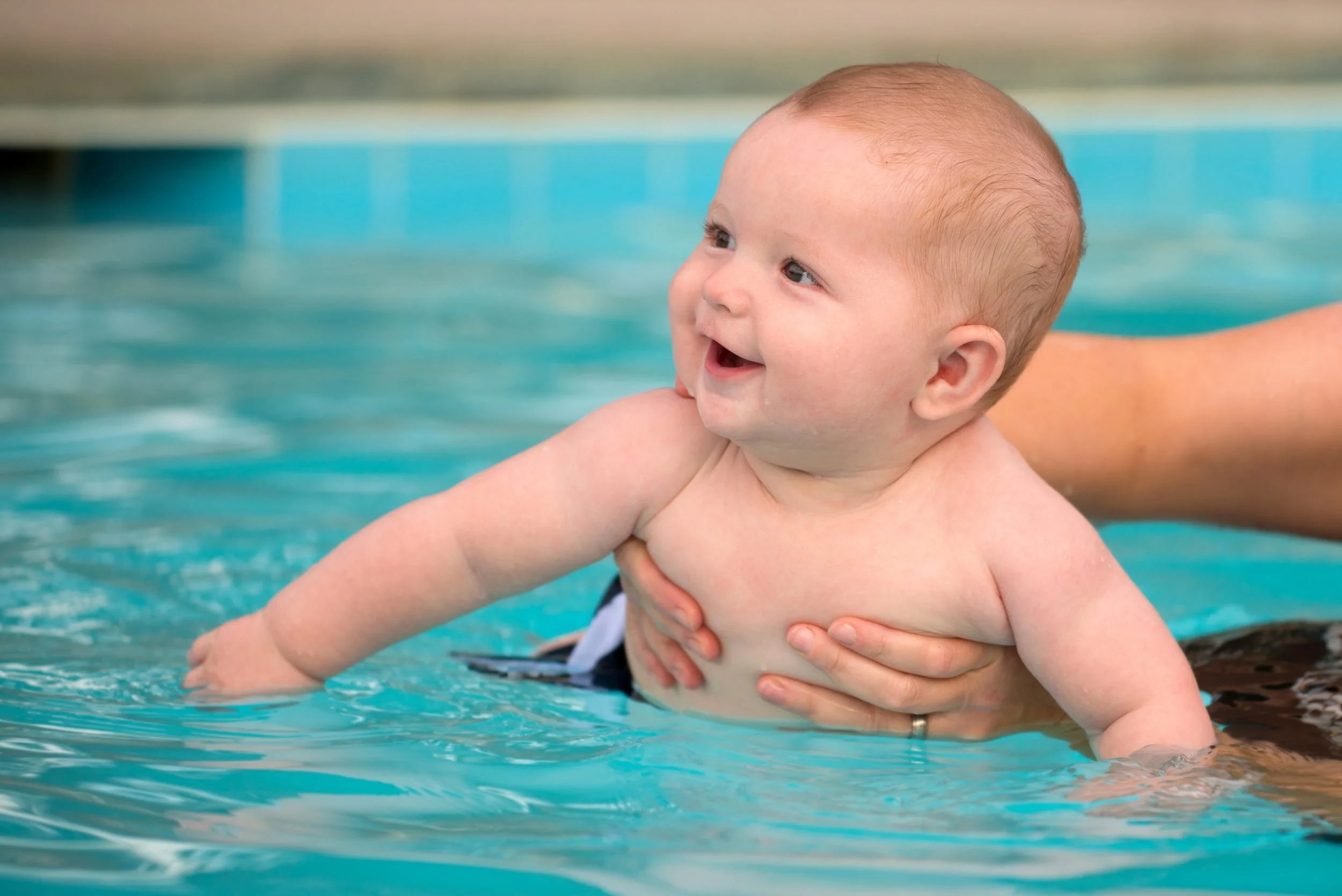
Baby Splash
Programme
Love the water together
Baby Splash is passionate about delivering a course that is going to introduce your baby to the water in a safe, fun and relaxed environment in Berkshire and Surrey. Our aim is to increase your confidence to that you enjoy this unique and special experience with your baby.
Baby Splash aims to teach babies water safety - not to panic if they fall into water, to kick to the surface and either hold on to the side or float on their backs. Baby Splash aims to teach skills that not only show your baby how to love the water, but to be confident and respectful of it.
Building confidence, one Splash at a time!
Through each stage babies build on confidence and gentle progression. Our carefully structured Baby Splash programme is based on play, word association, popular nursery rhymes and lots of fun!
The programme is designed to nurture each child's growth in the water — from their first gentle splash to swimming confidently on their own. We focus on building trust, encouraging curiosity, and celebrating every milestone with smiles and songs. Each class is a joyful step in developing water confidence and essential swim skills for life.
Baby Splash Programme
Tiny Turtles
Babies from birth to 12 months
Tiny Turtles classes are for all new babies under 12 months old that have not taken part in a swimming class before. This course has a gentle, calm and relaxed atmosphere to allow you and your baby to enjoy this special time in the water together. We will introduce you and your baby to our techniques and holds, to support your baby in the water as they move from reflex to voluntary movements. You and your baby will enjoy floating together and by introducing voice commands such as ‘ready go’ we gradually and softly teach your baby to swim underwater. By the end of the ten-week course your baby will be confidently swimming short distances underwater.
Jumping Jellyfish
6 to 12 months
Our Jumping Jellyfish course is for all babies under 12 months old that have already completed our Tiny Turtle course or an equivalent swimming course for babies. This course will allow your baby to increase their time under the water through various different submersions, you and your baby will enjoy swimming together with or without support and your baby will learn how to jump in, turn around and support themselves on the side. You and your baby will enjoy meeting under the water and your baby will begin to support themselves on a woggle.
Frantic Frogs
1 to 2 years
Our Frantic Frogs course is more lively allowing us to keep up with your baby constantly being on the go. The most natural way for your baby to learn is through play so throughout the course we sing songs and play games which is great to keep them interacted. They will begin to get quite fast on their fronts enabling them to use their woggles independently and they will be swimming longer distances under the water. Your toddler will be able to move around the side of the pool independently which we call ‘Monkey monkey’ and they will be able to climb out of the pool by themselves.
Crazy Crocodiles
2 to 3 years
Crazy crocodiles is as crazy as it sounds. Your little one will transition from using two woggles to one. We begin to take more and more support away. They will now be pushing off from the wall towards you and swimming quite some distance without any help at all. They will begin floating on their backs unaided and will be swimming towards the wall independently using their tiger arms. They will start lifting their head to breathe and begin to dive in from the side. This class is lots of fun and this is where you will see big progress from your little one.
Diving Dolphins
3 to 4 years
Still using songs and games the children are becoming more independent in this Diving Dolphins class. Swimming completely unaided with floating aids, diving independently for treasure and floating on their backs for long periods of time. Children are now working towards swimming independently on their fronts and backs for short distances unaided by their parents. They will use songs and games to build confidence and encourage them to try new techniques on their own with little parental help.
Laughing Lobsters
4 to 6 years
Our Laughing Lobsters class is about complete independence from the parent. Children are now working towards swimming larger distances on their backs and fronts without floating aids. They will be able to dive in, collect treasure and swim back to the side, push and glide to swim longer distances and float for longer amounts of the on their backs. Children still use songs and play games but are now starting to learn swimming techniques. Front crawl, back crawl and breastwork start to be introduced, as well as coerce breathing techniques. This is all done with nearly complete independence from the parent, helping the children work towards entering the pool alone.
Frequently Asked Questions
Here we provide the answers to common questions about baby swim classes and and the Baby Splash programme. If you’d like any more information or would like to find out more about the Baby Splash swim class timetable, please get in touch and we’ll be happy to help.
When can my baby start coming to Baby Splash?
Your baby can start Baby Splash classes as soon as you are ready to bring them although most babies do start at around 6 weeks old. It is best to start bringing your baby swimming from an early age, however it is never too late to introduce you baby to the water and can join us at any age – We will make you feel welcome.
What does my baby need to wear in the water?
Babies MUST wear a disposable swim nappy which can be purchased at most supermarkets, most commonly ‘Huggies Little Swimmers’. They also MUST wear a ‘Splash About Happy Nappy’ as double protection to any leakage’s. Babies under 12 months get colder much more quickly than older babies so it is advisable to purchase a ‘splash about baby wrap’ that acts as a wetsuit keeping your baby nice and warm throughout the swimming lesson. These can be purchased from Baby Splash – please click here.
Does my baby need immunisations before starting swimming classes?
There is no need for babies to have completed their immunisations before coming swimming. Further research on this can be seen on the NHS website www.immunisation.org.uk Although consult your doctor for advise if needed.
Is it safe for my baby to go under the water?
When a baby goes underwater the two main responses are the ‘gag reflex’, which is when water gets into your babies mouth the epiglottis closes and stops water from entering the windpipe. That’s why you often see pictures of babies swimming underwater with their mouths open. This reflex can last up until your baby is 18 months of age, however from 16 months onwards we teach children how to swim underwater in a different way to babies. The second is the ‘diving response’, this is amongst many more natural responses that babies have in the water.
What if my baby has a cold or is unwell?
If your baby is unwell or has a cold, it is not advisable to bring them swimming as this might make symptoms worse. Please consider the other babies in your group as your baby will spread infection and is unlikely to enjoy swimming at that time. If your baby has an ear infection, please do not bring them swimming until it has cleared up. It is not likely to have been caused by swimming, however it will be uncomfortable and your baby’s ear should be kept dry until it is clear. Babies should not be in the water for longer than 30 minutes and if your baby starts shivering when in the pool, take them out and wrap them up warm.
What do I need to bring with me to the lesson?
You will need a towel, for yourself and your baby, swimwear for yourself and your baby’s disposable nappy and swimwear. Babies get hungry after a session in the water so make sure you have a bottle of milk afterwards, if you are bottle feeding, as well as some snacks if your child is eating solids.
How much time should I leave between feeding my baby and swimming?
It is advisable that you feed your baby at least 1 hour before swimming although With babies we know it is often difficult to organise activities for exactly the right time of day especially as routines can change week to week. It is fine to give your baby a small feed before or even during a class. However, babies on solid food should have an hour between eating and swimming. Many babies enjoy a feed or snack after their swim. Tired babies will not get the most from their swim so try to give them a nap beforehand or do not hesitate to leave the pool if your baby has had enough.
What if my baby does not like the water?
There are many reasons your baby may cry in the water. Some babies need to adjust to the new environment they are in, with the sounds, splashes and echoes around them. Do not be put off if your baby is upset, the best thing you can do is comfort your baby and smile and they will soon get used to it.
Some babies go through a crying phase specific to swimming. This commonly happens around the age of 12 months and can seem frustrating if your baby has been very happy so far. It is important not to stop coming to classes during this time, your teacher has experienced this many times and can talk you through problems and adjust your program accordingly. Your relaxed positive attitude will help and soon your baby will only cry when it is time to get out!
Can I practice outside of lessons and on holiday?
Yes, babies are more comfortable in water the more they swim, although don’t swim with your baby for anymore than 30 minutes. Some pools may be colder than others so it is advisable that small babies wear the ‘splash about baby wrap’.
Do I need to be able to swim or go underwater myself?
No, you can learn our techniques without putting your head under the water, though it is lovely to meet your baby underwater and share the experience. Also, if you as a parent really don’t like swimming, or are very nervous in the water your baby will pick up on any fear or anxiety and that’s when they get upset in the water, so it may be best if your partner brings your child or you ask a grandparent, who likes the water, to take your child instead.










